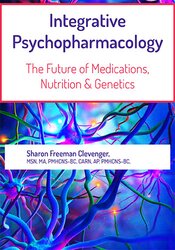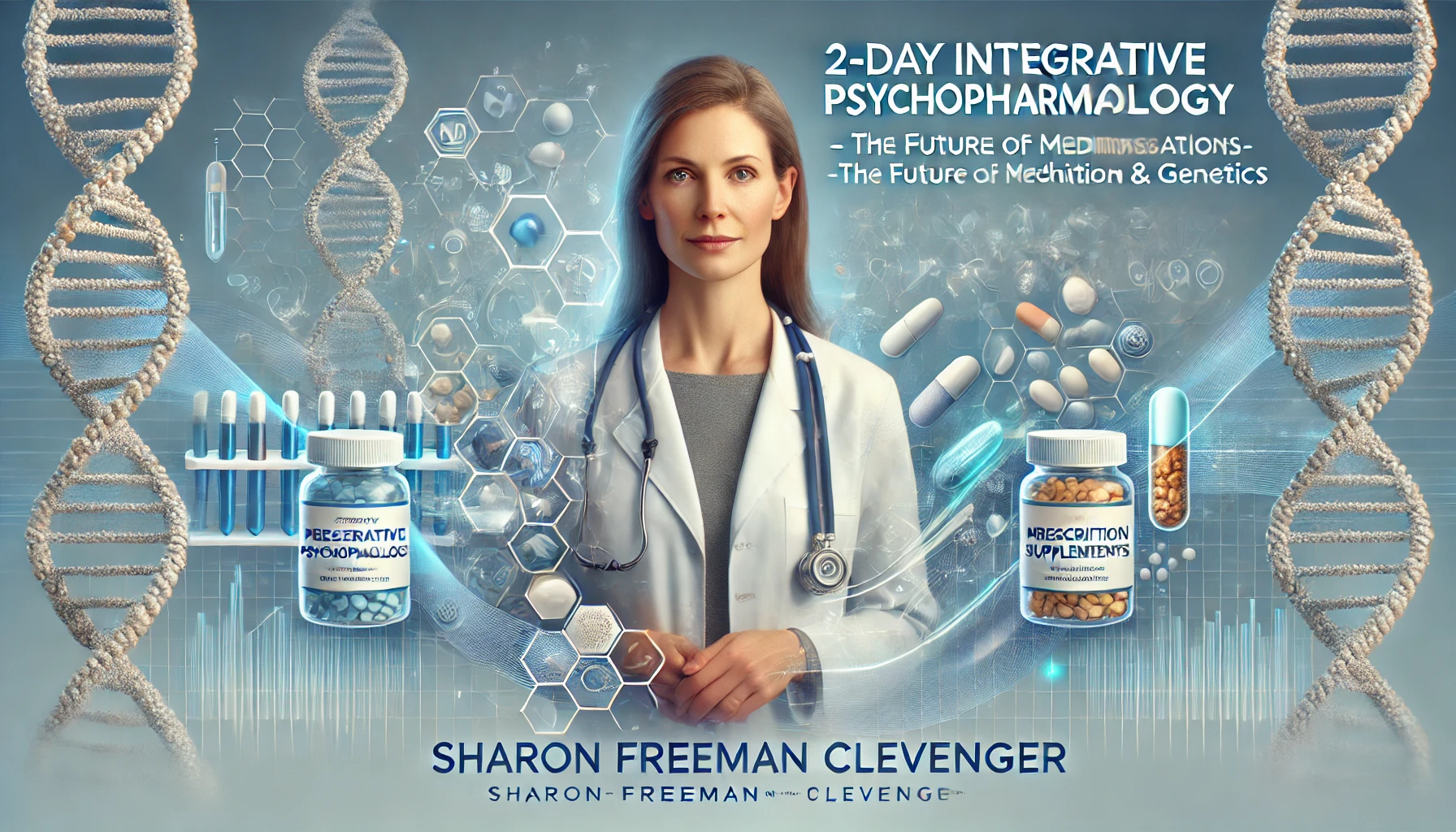2-Day Integrative Psychopharmacology -The Future of Medications, Nutrition and Genetics – Sharon Freeman Clevenger
2-Day Integrative Psychopharmacology -The Future of Medications, Nutrition and Genetics – Sharon Freeman Clevenger has the same quality as the author’s salapage.
Overview
Discover the Best Learning with 2-Day Integrative Psychopharmacology -The Future of Medications, Nutrition and Genetics – Sharon Freeman Clevenger
WisMentor is your ultimate destination for online learning. Explore "2-Day Integrative Psychopharmacology -The Future of Medications, Nutrition and Genetics – Sharon Freeman Clevenger" by top authors and instructors, designed to transform your skills and career. Start now and unlock your potential!
Salepage check: 2-Day Integrative Psychopharmacology -The Future of Medications, Nutrition and Genetics
Author: Sharon Freeman Clevenger
- Faculty:
- Sharon Freeman Clevenger
- Duration:
- 12 Hours 47 Minutes
- Format:
- Audio and Video
- Copyright:
- Nov 12, 2020
Description
Does this sound familiar? Your clients are taking multiple psychotropic medications prescribed by different healthcare professionals, not to mention their use of over-the-counter medications and herbal supplements. You discover that they have no idea who wrote which prescription or why they are even taking the medication. You realize that despite the confusion, you still have a responsibility to know your client’s symptoms, reactions to medications, and to coordinate their care. It’s more critical than ever for healthcare and mental health professionals to understand how psychotropic medications work, where in the body they work, and why they do (or don’t) improve your client’s therapeutic outcomes.
Are you confident in your role as both the client advocate and protector to effectively address medication-assisted treatments in your overall care plan?
Don’t miss the opportunity to spend two-action-packed days learning from expert Sharon M. Freeman Clevenger, MSN, MA, PMHCNS-BC. She will guide you through the newest advances and contemporary trends in blending medication management with nutrition and psychotherapy interventions for anxiety, depression, psychotic disorders and more. You’ll finish this seminar with the knowledge you need to answer clients’ questions, manage side effects, understand medication reactions and improve your treatment outcomes.
Handouts
| Manual – 2-Day Integrative Psychopharmacology (5.52 MB) | 207 Pages | Available after Purchase |
Outline
The Nitty Gritty of Psychopharmacology
- How the brain communicates
- Specifics about nutrition & neurotransmitters
- Gut-brain connection: What it is & does it really exist?
- Over-the-counter medications
- Nutraceuticals
- Vitamins: Differences & effectiveness
- Ancient Medications: Are they still useful?
Genetic Testing: Do’s and Don’ts!
- Do genetic assays help decide medication choices?
- Common genes tested & why
- How to use genetic assays
- Understanding Methylation
- Communicating about genetic testing
- Using genetic testing to predict response & failure
What to Do Before a Diagnosis or Prescription
- Symptoms vs. circuits
- How to identify which brain organ to target
- Using the body to heal itself: Smart nutrition
- Pharmacodynamics vs. pharmacokinetics
- Expected & unexpected interactions: CYPs made simple!
- Off-label medication use & concerns
- Pearls from the Black Box Warnings
Depressive Disorders
- Screening & differential diagnosis
- Integrative approaches: medications, nutraceuticals, herbals
- Types of antidepressants & the pearls & pitfalls of each
- Mild & severe side-effects: How to assess & what to do
- Age-related differences
- Treatment resistance: What it is and how to manage it
- Cutting-edge treatments: What’s new, What’s safe
Anxiety-Related Disorders
- Screening & differential diagnosis
- Brain organs: Targets & triggers
- Integrative approaches: medications, nutraceuticals, herbals
- Choosing gold-standard treatments
- Benzodiazepines: Pearls & problems
- Safely discontinuing benzodiazepines
Mood Disorders
- Screening, stigma & safety concerns
- Types of cyclical disorders: Different types & different treatments
- Types of medications: What to choose & what to avoid
- Monitoring for safety: Labs, age, pregnancy & side-effects
- Managing mild & severe side-effects: Assessment & interventions
- When to augment & what to augment with
Psychosis & Schizophrenia
- Brain targets for treatments
- 1st & 2nd generation anti-psychotics
- Monitoring for safety & severe side-effects
- Assessment & treatment for mild to severe side-effects
- Other uses for anti-psychotics with pearls for prescribing
- Avoiding negative side-effects: Tapering off, switching medications, augmentation
Attentional Disorders
- Neurobiology of cognitive dysfunction
- Screening & differential diagnosis
- The science behind treatment options
- Medication choices: stimulants, non-stimulants, nutraceuticals
Sleep Disorders
- Types of sleep disorders & how to screen
- Differential diagnosis
- Determining what came first
- Treatment options:
- Medications
- Cognitive behavioral therapy
- Integrative approaches: Nutraceuticals, herbals
- Adverse effects & interventions
Substance Use Disorders
- Screening, stigma, diagnosis & differentials
- Abuse vs. addiction
- Helping your client recover from use
- Categories of abusable drugs:
- Caffeine
- Nicotine
- Cannabis vs. CBD
- Alcohol
- Opiates
- Stimulants
- Designer drugs
Putting It All Together
- Resources for prescribers & non-prescribers
- Limitations of the research & associated risks
Faculty
Sharon Freeman Clevenger, MSN, MA, PMHCNS-BC, CARN, AP Related seminars and products: 1
Indiana Center for Cognitive Behavior Therapy
Sharon Freeman Clevenger, MSN, MA, PMHCNS-BC, CARN, AP, is the founder, psychiatric nurse practitioner, and senior clinical supervisor of the Indiana Center for Cognitive Behavior Therapy in Fort Wayne, Indiana. She has national certification as an Advanced Practice Psychiatric Clinical Nurse Specialist with prescriptive authority, as well as senior level international certification as an Advanced Practice Certified Addiction Nurse through the International Society of Nurses on Addictions. Sharon is former president of NAADAC, the Association for Addiction Professionals.
Sharon has lectured to professional and military/law enforcement audiences worldwide. She has authored more than 50 chapters and articles and has been a guest expert on the TV show, The Doctors. She is the co-editor for both the therapist manual and patient handbook of Overcoming Depression: A Cognitive Behavior Approach (Oxford University Press, 2009), senior editor and author of Living and Surviving in Harm’s Way: The Psychological Treatment Manual for Pre-and Post-Deployment of Military Members (Routledge, 2008), Behind the Badge: A Psychological Treatment Handbook for Law Enforcement Officers (Routledge, 2014), and senior editor and author of Cognitive Behavior Therapy in Nursing Practice (Springer Publishers, 2005).
Sharon has a Master’s degree in Advance Practice Psychiatric Mental Health Nursing from the University of Pennsylvania, and a Master of Arts in Counseling Psychology from the Adler School of Professional Psychology. She is a Doctor of Science candidate in Integrative Healthcare at Huntington University of Health Sciences in Knoxville, TN.
Speaker Disclosures:
Financial: Sharon Freeman Clevenger is Founder and Executive Director of the Indiana Center for Cognitive Behavior Therapy. She receives an honorarium from Allergan. She receives a speaking honorarium from PESI, Inc.
Nonfinancial: Sharon Freeman Clevenger has no relevant nonfinancial relationship to disclose.
About 2-Day Integrative Psychopharmacology -The Future of Medications, Nutrition and Genetics – Sharon Freeman Clevenger and Our Expert Authors
2-Day Integrative Psychopharmacology -The Future of Medications, Nutrition and Genetics – Sharon Freeman Clevenger is part of our extensive collection of over 70,000 premium courses at WisMentor. Created by renowned authors and industry leaders, this course is tailored to provide cutting-edge knowledge and actionable insights.
Why Choose WisMentor?
- 🌟 Access courses from world-renowned authors.
- 📚 Wide range of topics to suit your professional and personal growth needs.
- 💼 Lifetime access and flexible learning options.
Key Features of 2-Day Integrative Psychopharmacology -The Future of Medications, Nutrition and Genetics – Sharon Freeman Clevenger:
- ✅ Comprehensive content covering essential topics.
- ✅ Evidence-based methodologies and practical examples.
- ✅ Learn at your own pace with expert guidance.
How to Access Your Course?
Getting started is easy:
- 📩 Receive an instant download link via email.
- 🌐 Access your course anytime through your account dashboard.
- 📱 Compatible with all devices for a seamless experience.
Need Help?
Our dedicated support team is here to assist you. Visit our Contact Us page or reach out via email for any queries or assistance.
More from Our Collection:
Don’t miss the opportunity to explore more courses from top authors and enrich your learning journey at WisMentor. Find your next course now and take your skills to the next level.
Curriculum
FAQs
Requirements
- Technical Needs: Reliable internet access for online course components and access to course materials.
- Professional Experience: Ideal for mental health professionals, including psychiatrists, psychologists, psychiatric nurses, and counselors seeking to expand their knowledge in integrative approaches.
- Educational Background: A foundational understanding of psychology, psychiatry, or a related mental health field is recommended.
Features
- Continuing Education Credits: Opportunity to earn CE credits upon successful completion of the course.
- Interactive Learning: Engaging lectures, case studies, and group discussions to facilitate a deeper understanding of integrative treatments.
- Expert Instruction: Led by renowned professionals in the field, providing evidence-based insights and practical applications.
- Comprehensive Curriculum: Covers the latest advancements in psychopharmacology, including the role of nutrition and genetics in mental health.
Target audiences
- Healthcare Students: Advanced students in medical, nursing, or psychology programs focusing on contemporary mental health treatments.
- Medical Professionals: General practitioners and specialists interested in the interplay between psychopharmacology, nutrition, and genetics.
- Mental Health Practitioners: Psychiatrists, psychologists, psychiatric nurses, and counselors aiming to incorporate integrative methods into their practice.


